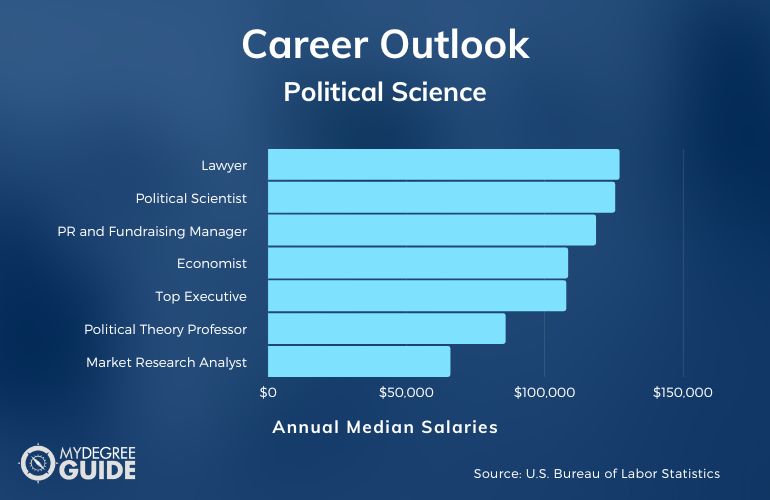

PhD Political Science Salary: Exploring Earning Potential
- political science
The average salary for a Ph.D. In Political Science is around $90,000 to $120,000 annually.
This salary can vary based on location, experience, and the specific role within the field. A Ph. D. In P olitical Science opens doors to a wide range of career opportunities, including academia, research, public policy analysis, and consulting. Graduates can work in government agencies, non-profit organizations, think tanks, and international institutions.
With the growing demand for expertise in political analysis and policy development, individuals with a Ph. D. In Political Science can find rewarding positions in both the public and private sectors. This advanced degree not only offers higher earning potential but also provides the opportunity to make a meaningful impact in addressing complex political and societal issues.
Political Science Phd: Earning Potential And Career Paths
Political Science PhD: Earning Potential and Career Paths
Positions In Academia
With a Political Science PhD, individuals can pursue rewarding career paths within academia. They have the opportunity to become professors, lecturers, or researchers at universities and colleges. Their extensive knowledge in political theory, comparative politics, and international relations enables them to contribute to the academic world through teaching, publishing research papers, and mentoring students.
Opportunities In Government And Policy Analysis
Political Science PhD holders are well-equipped for roles in government and policy analysis. They can work as political consultants, policy analysts, or government advisors, providing valuable insights and expertise on political trends, public policies , and international relations. Their deep understanding of political systems and governance makes them essential assets in shaping governmental strategies and decision-making processes.
Roles In Non-profit Organizations
Political Science PhD graduates are also poised to make a meaningful impact in non-profit organizations. They can serve as policy advocates, program managers, or research directors, influencing social change and public welfare through their expertise in public policy analysis, advocacy strategies, and community engagement. Their knowledge of political dynamics and societal structures allows them to drive meaningful progress within non-profit sectors.
Factors Influencing Salary For Political Science Phds
When considering a career as a political science PhD, it’s essential to understand the factors that can impact your potential salary. Understanding the variables that affect compensation can help individuals make informed decisions about their career paths and future academic endeavors.
Location-based Salary Discrepancies
The geographical location in which a political science PhD professional works can significantly affect their salary. In urban areas with high living costs , such as Washington, D.C. or New York City, political science professionals may earn more than those working in more rural areas. Location-based salary discrepancies can reflect differences in the demand for political science professionals, as well as differences in the cost of living.
Specializations And Research Areas Impact
Political science professionals with specialized knowledge and research expertise may command higher salaries. For example, those with expertise in international relations or public policy may find more lucrative opportunities. Similarly, individuals with expertise in quantitative research methods or data analysis may see a higher demand for their skills, potentially translating to higher compensation.
Experience And Tenure In The Field
Experience and tenure in the field play a crucial role in determining the salary of political science PhDs. Individuals with significant experience and a proven track record of valuable contributions to the field may be compensated at a higher rate than newly graduated professionals. Additionally, tenured professors in academic institutions may receive higher salaries due to their seniority and extensive experience in teaching and research.
Comparative Analysis Of Political Science Phd Salaries
In a comparative analysis of political science PhD salaries, it is essential to understand how they stack up against other fields. Despite political science being a specialized field, it competes with other social sciences and humanities disciplines, such as economics, sociology, and public policy. According to data from the Bureau of Labor Statistics, the median salary for political scientists is competitive, but it typically lags behind fields such as economics and business administration.
Gender and diversity considerations within the realm of political science PhD salaries are crucial in understanding the current landscape. Studies have shown that there exists a gender pay gap in academia, with male political science professors earning higher salaries than their female counterparts. Additionally, there are disparities among racial and ethnic groups. These disparities emphasize the need for proactive measures to address and rectify such inequities.
The salary trends for political science PhDs have displayed a notable trajectory over the past decade. Despite a general increase in salaries across various fields, political science has faced challenges in keeping pace with inflation and rising living costs. Data shows that while salaries have experienced incremental growth, they haven’t risen at the same rate as some other academic disciplines. The last decade has also seen a shift in demand for political science graduates, which has impacted salary levels.
Strategies For Maximizing Political Science Phd Earning Potential
Maximizing the earning potential of a Political Science PhD requires careful planning and strategic actions. With the right approach to networking, negotiation, and professional development, political science graduates can significantly boost their income and career opportunities.
Networking And Professional Development
Building a strong professional network is crucial for advancing in the field of political science. Networking can open up doors to various job opportunities, consulting gigs, and valuable connections within academic and governmental institutions. Attending conferences, seminars, and workshops is essential for staying updated with the latest trends and research in the field. Involvement in professional associations and societies also provides a platform for expanding one’s network and staying connected with peers in the industry.
Negotiating Salary And Benefits
When striving to maximize their earning potential, political science PhD holders should be proactive in negotiating salary and benefits . Researching industry standards and salary benchmarks can provide essential leverage during the negotiation process. Demonstrating the value of one’s expertise and unique skill set is paramount. Additionally, it’s crucial to consider non-monetary benefits such as healthcare, retirement plans, and professional development opportunities as part of the negotiation process.
Pursuing Additional Certifications Or Qualifications
Enrolling in additional certifications or qualifications can significantly enhance the earning potential of political science PhD graduates. Pursuing additional certifications or qualifications in areas like data analysis, policy development, or project management can open doors to higher-paying positions. Specialized training in areas that complement political science, such as public administration or international relations, can position graduates for roles with greater responsibility and compensation.
Future Outlook And Projections For Political Science Phd Salaries
In the ever-changing landscape of the job market, it’s crucial to stay abreast of the anticipated growth, impact of societal and political trends, and emerging opportunities for higher earning potentials in the realm of Political Science PhD salaries. As the world evolves, so too does the demand for qualified political scientists, creating an environment ripe with potential for those pursuing careers in this field.
Anticipated Growth In The Field
The field of political science is expected to experience steady growth in the coming years. Political scientists are likely to see a rise in demand as governments, organizations, and entities seek expert analysis and guidance in navigating complex geopolitical landscapes and global relations. This increase in demand for political scientists is likely to translate into higher salaries and improved career prospects for those with a Political Science PhD.
Impact Of Current Societal And Political Trends
The current societal and political climate has a profound impact on the career prospects and earning potential of political scientists. With the ongoing shifts in global geopolitics, societal movements, and policy changes, the need for expert analysis, policy development, and strategic guidance from political scientists has never been more crucial. This is fueling an increasing demand for individuals with specialized knowledge and expertise in political science , translating to higher earning potentials and a broader range of career opportunities for PhD holders in this field.
Emerging Opportunities For Higher Earning Potentials
Political Science PhD holders can expect to see a surge in emerging opportunities for higher earning potentials in various sectors, including academia, government, think tanks, research institutions, and international organizations. With the increasing complexity of global issues and the interdisciplinary nature of political science , professionals with advanced degrees are poised to benefit from a variety of high-impact roles and leadership positions, thereby securing attractive financial rewards and career advancements.
Frequently Asked Questions Of Phd Political Science Salary
What is the average salary for a phd in political science.
The average salary for a PhD in Political Science varies based on factors such as location, experience, and specific job role. However, it generally ranges from $60,000 to $100,000 per year.
What Career Opportunities Are Available For Phd Graduates In Political Science?
PhD graduates in Political Science can pursue careers in academia, research institutions, government agencies, international organizations, and non-profit organizations. They can also work as political analysts, policy advisors, or consultants.
How Does The Salary For A Phd In Political Science Compare To Other Fields?
The salary for a PhD in Political Science is competitive compared to other fields. It often parallels the earnings of professionals in related sectors such as sociology, economics, and public policy. However, actual salaries may vary based on individual qualifications and experience.
A Ph. D. In political science can lead to rewarding careers in academia, government, and research. The salary potential is promising, with opportunities for advancement. Understanding the industry trends and job market demand will help you make informed career decisions.
With the right qualifications and experience, you can look forward to a lucrative and fulfilling career in political science.
Related Post
Sociological imagination by c wright mills: unleashing social insights, political science internships : your path to political experience, political science research questions : uncovering insightful and relevant inquiries, jobs for sociology degrees: career paths & opportunities, leave a reply cancel reply.
Your email address will not be published. Required fields are marked *
Save my name, email, and website in this browser for the next time I comment.
Recent Post
Should felons be allowed to vote debunking the myths, who got voted off of dancing with the stars tonight: shocking elimination revealed, what is a roll call vote unlocking the significance and impact, qué enfermedad es cuando votas sangre por la boca: descúbrelo aquí, who got voted off of dwts tonight: shocking elimination unveiled, can felons vote in texas discover the power of restored voting rights.
Our passion lies in making the complex and fascinating world of political science accessible to learners of all levels, fostering a deep understanding of political dynamics, governance, and global affairs.
© 2023 ALL RIGHTS RESERVED BY - PoliticalScienceGuru
By joining our mailing list, you’re not just subscribing to a newsletter; you’re becoming part of the PoliticalScienceGuru.com family.
Graduate Programs
Political science.
Our faculty and students profit from the many outstanding institutes, centers and programs at Brown that relate to the study of politics.
The Department of Political Science covers the four main subfields in the discipline:
- American politics focuses on the behavior of the executive, legislative, and judicial branches of government; state and local politics; the influence of public opinion, interest groups, and political parties on decision-making; and issues of race and gender.
- Comparative politics focuses on the comparative study of the behavior of governments and political institutions, non-governmental actors across the world, and on the relationships between political and economic factors in different cultures and societies.
- International politics considers how political decisions are made in a world without a central authority above the nation-state. Recent emphases include a significant role for international law, norms, and organizations.
- Political theory seeks to analyze both historically and philosophically the origins and underpinnings of political values.
Additional Resources
Our faculty and students profit from the many outstanding institutes, centers, and programs at Brown that relate to the study of politics. These include the Taubman Center for Public Policy and American Institutions , the Watson Institute for International and Public Affairs , the Master of Public Affairs program , the Urban Studies Program , the Saxena Center for Contemporary South Asia , the Center for Latin American and Caribbean Studies , the Center for Philosophy, Politics and Economics , the Center for the Study of Race and Ethnicity in America , Middle East Studies , Development Studies , the Population Studies and Training Center , and Africana Studies .
Application Information
In addition to the GRE and writing sample, applicants are required to submit a personal statement, three letters of recommendation, transcript(s), and, if applicable, proof of language proficiency. For further application information, please also see the Political Science admission guidance and the Graduate School's admission guidance .
Application Requirements
Gre subject:.
Not required
GRE General:
Official transcripts:, letters of recommendations:.
Required (3)
Writing Sample:
Personal statement:, dates/deadlines, application deadline, completion requirements.
The Ph.D. requires passing thirteen graduate-level courses with a minimum grade of B or better, though A grades are expected, including methods, field proseminars, course(s) in political theory, and Prospectus Writing. Students must also pass a written and oral preliminary examination in their primary field; a written and oral presentation of a dissertation proposal; and a written and oral presentation of a dissertation. A minimum of two semesters as a teaching assistant is also required.
Alumni Careers

Contact and Location
Department of political science, mailing address.
- Program Faculty
- Program Handbook
- Graduate School Handbook
What Can You Do with a PhD in Political Science? [2024 Guide]
If you’re fascinated by political systems and want to study their influence in-depth, you may find yourself asking, “What can you do with a PhD in Political Science?”

This doctoral program may present opportunities to learn about global politics, explore conflicts of power, and practice policy analysis. You will likely conduct original research in the field and prepare a dissertation with your findings.
Editorial Listing ShortCode:
This terminal degree may help propel you toward the top of the political science field and prepare you for a career in an educational, government, or private institution, where you can help shape others’ understandings of politics and power.
What Can You Do with a PhD in Political Science?

The field of political science is filled with opportunities to gather data, conduct research, analyze policies, study power structures, and explore ideas.
Once you’ve earned a PhD, you may apply that knowledge and skillset with jobs both inside and outside of academia. Academic positions are some of the most popular PhD political science jobs.
You may teach classes on international relations or international affairs. As a professor, you might also conduct research. The average annual salary for postsecondary political science teachers is $85,760, according to the Bureau of Labor Statistics. Working in the field as a political scientist is another career track to consider.
Data from the Bureau of Labor Statistics shows that 48% of political scientists are employed by the federal government. Many political science professionals work as policy analysts. Your knowledge of power systems could also be beneficial in a public relations role. You might be particularly well-suited to work as a press secretary for a political candidate.
A doctorate in political science could also inform your work as a journalist, a broadcast news analyst, a government official, a survey researcher, or a market research analyst. With additional training, you may also become a lawyer.
5 Things You Can Do with a PhD in Political Science

Having a Ph.D. in Political Science can help you enter into an academic career or apply for advanced positions in non-academic settings.
With this traditional or online political science degree , you might be employed by an academic institution, a government organization, a think tank, or a private business.
1. Broadcast News Analyst

Journalists and news analysts often cover issues related to politics and power. With your expert knowledge of political science, your voice might be trusted as a source of information and analysis regarding current events.
Reporters and other news professionals work for television networks, radio stations, newspapers, magazines, websites, and other forms of media. You might work for one particular outlet or share your insight with a variety of news sources.
2. Political Scientist

Anyone who studies political systems and power structures can be thought of as a political scientist. You may be especially successful in this role if you focus your studies on one particular aspect of political science, such as pursuing a PhD in International Relations.
As a political scientists, you may work for the federal government, labor unions, research institutions, and grantmaking agencies. You may also act as a policy analyst, evaluating the influence of laws and regulations.
3. Political Science Postsecondary Teacher

If you want to become a full-time college faculty member and work toward a tenure-track position, having an online PhD in Political Science may be a valuable asset. As a professor, you might teach undergraduate or graduate students.
Many faculty members conduct research in addition to their teaching responsibilities. Your university might fund your research, allow you to have students assist with your projects, and encourage you to seek publication.
4. Public Relations Specialist

Individuals and organizations depend on public relations specialists to represent them to the public, convey messages on their behalf, and project a sense of calm and control during crisis situations.
Your knowledge of political science may help you understand the dynamics at play in PR settings. You might be especially successful as a press secretary. This job title is used for public relations specialists who represent political figures.
5. Survey Researcher

If you’re interested in investigating the effects of politics and policies, you may consider a career as a survey researcher.
You may gather data from survey participants, analyze the findings, and present your information to others who may use it to shape legislation, organizational policies, or lobbying platforms.
As a survey researcher, you could work for a research or polling organization. There are also survey jobs within educational and government institutions.
Political Science Careers & Salaries

According to the Bureau of Labor Statistics , political scientists earn an average annual salary of $125,350, and jobs in this field are projected to increase at a 6% rate for the next decade. You may also pursue the following careers or positions with a doctorate in political science.
| Lawyer | $126,930 |
| Political Scientist | $125,350 |
| Public Relations and Fundraising Manager | $118,430 |
| Economist | $108,350 |
| Top Executive | $107,680 |
| Political Theory Professor | $85,760 |
| Market Research Analyst | $65,810 |
| Lobbyist | $62,810 |
| Survey Researcher | $59,870 |
| Reporter, Correspondent, or Broadcast News Analyst | $49,300 |
While academic positions are sometimes thought of as the most highly sought PhD political science jobs, this extensive list demonstrates that there is a wide range of careers you could pursue with this degree.
How Much Money Can You Make with a PhD in Political Science?

According to the Bureau of Labor Statistics, most political scientists earn between $62,840 and $170,800 per year. Factors such as your professional experience and the state in which you work can influence your PhD political science salary.
This is a broad field, so your salary may largely depend on what type of employer you have. Political scientists who work in the professional, scientific, and technical services sector earn an average of $136,640 per year. Federal government political scientists earn an average of $133,460.
The average salary for political scientists who work for educational, religious, and grantmaking organizations is around $87,910.
What Is a PhD in Political Science Good For?

Political science doctoral programs can help provide the training that you need for a career at a university. You may teach political science at the college level or work in a university-affiliated research lab.
Your degree may also qualify you to work as a policy analyst or a political scientist. As a political scientist, you may find work in government agencies, political groups, and private organizations.
You may also become a public relations professional, a market research analyst, or a survey researcher. A political science PhD could also enhance your career as a business executive, a lawyer, a legislator, or a journalist.
How Long Does It Take to Get a PhD in Political Science?

Your time in a doctoral program will be broken into several stages. A doctorate can typically be completed in 3 to 5 years. The length of each program may vary depending on your school’s structure and your personal schedule.
The coursework and examination portion of your studies may take 2 to 3 years. After that will come the dissertation portion. You may spend at least 1 full year conducting research and 1 or more years completing your project.
Some universities expect PhD political sciences students to be finished within a specific timeframe, but you may be able to request an extension.
Can You Get a PhD in Political Science?

Universities do offer Ph.D. programs in political science. Holding this degree is often a requirement for a job as a survey researcher, a political scientist, or a postsecondary political science educator.
You may have the option to select one or more areas of specialization, such as comparative politics or conflict management. During your studies, you may take courses on American politics, political analysis, and transnational politics.
You will likely complete a dissertation or another doctoral capstone project. If this field of study interests you, you may consider looking for a school that offers an online PhD in Political Science program.
Is a PhD in Political Science Worth It?

Yes, a PhD in Political Science is worth it for many students. According to the Bureau of Labor Statistics, jobs in the life, physical, and social science field are set to grow at 5% over the next ten years, faster than the average overall growth.
Common political science careers in this field include postsecondary teacher, political scientist, public relations specialist, broadcast news analyst, and survey researcher.
Having a political science PhD may qualify you for a variety of non-academic jobs, but it may also lead to a career as a professor. If your goal is to secure a tenure-track position, then you’ll certainly need a PhD.
Getting Your PhD in Political Science Online

Politics is a fascinating topic that touches nearly every area of life. A political science PhD program may advance your knowledge about political systems and help you explore the ways that legislation and current events affect people and structures.
A doctorate in this field may help you further your political science, public relations, research, or journalism career within academia, the federal government, or a private organization.
You may want to consider exploring the best schools for political science for a flexible yet thorough approach to doctoral studies. Through an accredited online university, you may earn a respected political science doctorate that can help you take your career to the next level.

Build a Career You'll Love
Political science salary in the united states.
How much does a Political Science make in the United States? The salary range for a Political Science job is from $43,652 to $62,158 per year in the United States. Click on the filter to check out Political Science job salaries by hourly, weekly, biweekly, semimonthly, monthly, and yearly.
- Per semimonth
- Connecticut
- District of Columbia
- Massachusetts
- Mississippi
- North Carolina
- North Dakota
- New Hampshire
- Pennsylvania
- Rhode Island
- South Carolina
- South Dakota
- West Virginia
- San Francisco, CA
- Washington, DC
- Chicago, IL
- New York, NY
HOW SHOULD YOU USE THIS DATA?
Employees: Use this as a guide for salary expectations, but be aware that responsibilities can change across companies for the same job title, so there may be differences between this data, other free site and our subscription products bought by employers.
Employers: This data could be used as reference point in your market pricing, but not the only source, due to differences across jobs locations, and sizes of companies.Consider additional sources like our Employer reported data.
Our consulting team crafts efficient, data-driven solutions using the power of CompAnalyst ® , ensuring your challenges are met head-on.
The trusted data and intuitive software your organization needs to get pay right.
Let our management tool - JobArchitect™ streamline your job description process. Say goodbye to the hassle of crafting job descriptions.
What Should I Pay?
Highest Paying Cities for Political Science in the United States

States with Higher Salaries for Political Science
How much do similar professions get paid in the united states, how much should you be earning, what does a political science do.
The School of Legal and Political Studies is one of the two graduate programs at the Graduate Schools of Law and Politics and offers a Master’s Degree and a Doctoral Degree in the fields of law or political science.
Or theory, and attempts to do so have seldom lasted more than a generation, making political science a discipline of many trends but few classics.
A focus on studying political behavior, rather than institutions or interpretation of legal texts, characterized early behavioral political science, including work by.
Than elsewhere; other institutions, especially those outside the United States, see political science as part of a broader discipline of.
Per se, political science may be a separate department housed as part of a division or school of humanities or.
View Job Skills and Competency Data for more than 15,000 Job Titles, 18 Industries, and 26 Job Families.
Most Common Benefits for Political Science
Related companies for political science in the united states, frequently asked questions, do i receive fair pay as a political science currently, what are the responsibilities of a political science, how much do similar jobs to political science make.
- Professor Of Political Science
- Associate Professor Of Political Science
- Assistant Professor Of Political Science
- Adjunct Lecturer, Political Science
- Assistant Professor, Political Science
- Political Director
- Political Organizer
- Political Editor
- Political Scientist
- Political Coordinator
Where can I get a higher Political Science salary in the United States?
What is the political science's salary range in the united states, career insights.

Our websites may use cookies to personalize and enhance your experience. By continuing without changing your cookie settings, you agree to this collection. For more information, please see our University Websites Privacy Notice .
College of Liberal Arts and Sciences
Department of Political Science
Ph.d. in political science.
Gain advanced training and experience with a Ph.D. in Political Science from UConn.
The UConn Ph.D. program in political science prepares students to do innovative research and teaching at institutions of higher education. It also prepares them for careers in government, as well as a range of non-governmental organizations and research foundations.
Our Ph.D. students work closely with faculty in their classes and through research collaboration. Many students conduct their own research with guidance from faculty mentors, resulting in publications in some of the top journals in the field.
Ph.D. Subfields
Ph.D. students can specialize in one of several diverse subfields:
- American politics.
- Comparative politics.
- International relations.
- Political theory.
- Public law.
Learn more about Ph.D. Outcomes
View Admissions Requirements
Requirements and Options
The Ph.D. program includes two stages. In the first stage, students do course work to develop expertise in two chosen subfields in which they will take Ph.D. exams.
Once the student has completed their scope, method, and elective requirements and successfully passed the Ph.D. exams, they become ABD (or all but dissertation). At this stage, students form a dissertation committee and work with their committee to prepare a dissertation proposal outlining an original research project. When this project is complete, they defend the dissertation.
Students are required to take Ph.D. exams in two of the Department’s five subfields. In order to take the Ph.D. exam in a field, students must have completed the course requirements outlined below.
In addition, all doctoral candidates must take:
- POLS 5600. Nature of Political Inquiry.
- POLS 5605. Introduction to Quantitative Methods.
- POLS 5615. Introduction to Qualitative Methods.
- One advanced methods elective.
Finally, all Ph.D. students must enroll in GRAD 6950-003 in their first, second, third, and fourth semesters. To receive the grade of “Pass,” they must attend four scholarly presentations in the relevant semester. The student and major advisor should together determine which presentations to attend and what will constitute sufficient evidence of having attended.

Subfield Requirements
American politics.
In preparing for the Ph.D. Exam in American politics, students must successfully complete the following courses:
- POLS 5406. Seminar in the American Political System
- POLS 5407. Advanced Topics in American Political Institutions and Policy
- POLS 5408. Advanced Topics in American Political Behavior
- POLS 5409. Advanced Topics in American Race, Gender and Ethnic Politics
Comparative Politics
Students should take four courses in POLS 5240:
- Regime Types
- Political Institutions
- Comparative Political Economy
- Contentious Politics
International Relations
In preparing for the Ph.D. exam in international relations, students must successfully complete POLS 5300: Pro-seminar in International Relations and at least three other courses from the following list:
- POLS 5115. Theories of Human Rights
- POLS 5305. Foreign Policy Analysis
- POLS 5315. International Security
- POLS 5320. International Conflict and Cooperation
- POLS 5322. Assessing Human Security
- POLS 5325. International Political Economy
- POLS 5330. International Organization and Law
- POLS 5335. US Foreign Policy in the Middle East
- POLS 5340. Politics and Security in the Middle East
- POLS 5345. Foreign Policies of the Russian Federation and the Former USSR
- POLS 5390. Economic Rights
- A special topics course approved by the IR Field Committee (some prior examples include Special Topics in Human Rights, Feminist Political Methodologies, East Asian Political Economy, Africana Dialogues, and European Approaches to International Relations)
No more than two of the four required courses may be taken with a single international relations faculty member.
International Relations Subfield Comprehensive Exam Policy
In consultation with their faculty advisor, students who take the Ph.D. exam in international relations will choose one of the following options:
- Write a sole-authored research paper that meets at least a “revise and resubmit” peer- review standard. The paper can be a revision of a paper written for a seminar, conference, etc. The length of the paper is to be between 8,000 and 12,000 words, all-inclusive. The paper should build toward the student’s dissertation. The student will identify a journal for which it will be targeted and are required to note this choice on the manuscript’s title page. The format/style of the submission will be determined by the standards of the target journal. No actual submission to a journal is required. A three-member faculty committee will read and grade the paper, with the committee issuing a single rating of “Reject,” “Revise and Resubmit,” or “Accept.” A grade of “pass” for the exam requires a rating of either “Revise and Resubmit” or “Accept.” A grade of “Reject” is considered a failing grade for the exam. At the discretion of the faculty committee, this option may include an oral defense of the paper with a three-member faculty committee.
- Write an annotated graduate-level syllabus for a 13-week course that introduces students to the field of international relations. This option also requires an oral defense of the syllabus with a three-member faculty committee. The syllabus may be theoretical or thematic in the type of overview of the field provided, with the understanding that theory is one of the major themes of international relations. Students will consult with their faculty advisor regarding which of these two types of syllabi to write. The syllabus must contain specified assignments which are justified relative to course goals and content. For each of the course’s 13 weeks, the syllabus must include: (i) a detailed reading list, and (ii) a fully realized description of the week’s pedagogical goals and content (e.g., How do these readings fit together in their address of the week’s theme/goals?” “How are these readings justified, pedagogically?” “How do these readings address the relevant disciplinary terrain?”).
Political theory
Prior to taking the Ph.D. exam in political theory, students must successfully complete at least four graduate courses in political theory, including POLS 5100: Pro-seminar in Political Theory. We strongly encourage students to take additional coursework with a strong theoretical component.
Some recently offered graduate seminars in political theory include:
- Critical Theory
- Critical Race Theory
- Theories of Human Rights
- Comparative Political Theory
- Women Political Thinkers
- Emotions and Politics
- Public Reason and Deliberation
- Black Feminist Theory and Politics
Political Theory Subfield Comprehensive Exam Policy
Field Designation and Exam Structure Students must pass four political theory courses with a grade of B or higher and with a grade point average of 3.5 or higher in those courses before taking the exam. In consultation with their faculty advisor, and with the approval of the political theory subfield, students will designate if political theory will be a Field of Specialization (FOS) or a Field of Competence (FOC) for their PhD studies.
Field of Specialization (FOS)
- The exam for those who designate political theory as an FOS will comprise both the research paper and the annotated syllabus. They must pass both components to pass the Ph.D. exam. If they do not pass a single component at their first attempt, they will only retake that component during their second attempt. If they fail either component twice, they fail the exam.
- Those who designate political theory as an FOS must take a fifth course with significant political theory content, either graded or as an audit, prior to defending their dissertation.
Field of Competence (FOC) The exam for those who designate political theory as an FOC will comprise the annotated syllabus. If they do not pass at their first attempt, they may only attempt the exam a second time. If they fail at their second attempt, they fail the exam. Research Paper:
- The student will submit a single-authored research paper of between 8,000 and 12,000 words all-inclusive, which may be based upon a previously written, unpublished paper.
- They will identify a target journal for the paper and must note this choice on the manuscript’s title page. The format and style of the submission must meet the standards of the target journal, with the possible exception of the previously-stated word-length requirement. The student does not need to submit the paper to any journal.
- A three-member faculty committee will read the paper and each member will issue a single rating of “Accept,” “Revise and Resubmit,” or “Reject.” Two or more ratings of “Accept” will result in a grade of “pass with distinction” for the exam. Two or more ratings of “Revise and Resubmit” or better will result in a grade of “pass” for the exam. Two or more ratings of “Reject” will result in a grade of “fail” for the exam. Each committee member will provide written feedback to the student.
Annotated Syllabus:
- The student will submit an annotated syllabus for a 14-week, first-year, graduate-level course that introduces students to the field of political theory.
- This should cover a broad range of historical political thinkers and a variety of different approaches to and themes in political theory. The student must include a clear, written defense of their choices regarding the overall structure of the syllabus, including why figures, texts, and themes covered are indispensable to orienting students to the field of political theory. Students should consult the Highly Recommended and Recommended sources from the Political Theory subfield Ph.D. reading list in constructing their syllabus.
- The syllabus must contain a statement of the overall pedagogical goals of the course and a list of specific assignments with clear justifications for how they help achieve those goals.
- a complete description of that week’s topics or themes, connecting them, as appropriate, with themes from weeks that precede and follow it, and specific pedagogical goals,
- a detailed reading list, including annotations, for each reading; the annotations should be between 100 and 150 words for each article or group of two or fewer chapters from a book and 200 to 250 words for each book or group of three or more chapters from a book.
- A three-member faculty committee will read the syllabus and provide written feedback to the student. If the committee deems the syllabus as not possibly passing based upon the overall quality of the written syllabus, it will assign the student a grade of “fail” for the exam. If the committee deems the syllabus as possibly passing, the student must subsequently participate in an oral defense of the syllabus with the committee. At the end of the oral defense, the committee will assign the student a grade of “pass with distinction,” “pass,” or “fail” based upon the overall quality of the written syllabus and the oral defense.
In preparing for the Ph.D. Exam in public law, students must successfully complete all three of the following courses:
- POLS 5505. Law and Society
- POLS 5510. Judicial Decision-making
- POLS 5515. Constitutional Interpretation
And at least one of the following:
- POLS 5010. Law and Social Change
- POLS 5010. Seminar in Legal Theory/Jurisprudence
View the full requirements on the UConn Graduate Catalog's website.
Applicants for the Ph.D. program in political science must apply to and be accepted by both the UConn Graduate School and the Department of Political Science. Applicants must apply online via the UConn Graduate School website.
All application materials, including supporting documents, must be received by January 15. Applications will not be processed until the application fee is paid. The Graduate School can, when a genuine need is demonstrated, extend fee waivers. Applicants must meet a minimum GPA of 3.0.
Required Application Materials
The Department of Political Science is unable to consider applications until the requirements of the Graduate School have been fulfilled. In addition to the Graduate School materials:
- The Department of Political Science requires a personal statement, writing sample, and three letters of recommendation. The Department also recommends (but does not require) students submit the test scores from the verbal and quantitative sections of the Graduate Record Examinations (GRE).
- The personal statement should indicate that you understand what undertaking a Ph.D. in political science involves, that you have relevant preparation for it, and that UConn’s program will enable you to work effectively toward your aims.
- Applicants without a master’s degree should apply directly to the Ph.D. program.
- Your writing sample should be a substantial piece of written work that demonstrates your ability to communicate effectively and to engage in sophisticated critical reasoning with materials and on themes related to the study of politics.
- Your letter writers should be sure that they will be able to submit their recommendations for you by the January 15th deadline and that they can write with considerable detail about your intellectual experience and talent and suitability to a doctoral program. There is no form for letters of recommendation, but they should appear on letterhead with complete contact information for the person writing the letter.
- Letter writers will receive an email asking them to upload your letter to the graduate application website.
International applicants must submit transcripts and degree statements both in the original language and an official English translation. Additionally, international applicants from countries where the official language is not English, or who have not received a degree from an institution where the language of instruction is English, must submit the results of the TOEFL examination to the Graduate Admissions Office:
Graduate School, University of Connecticut 438 Whitney Road Ext., Unit 1152 Storrs, CT 06269-1152 Phone: (860) 486-3617
Application Deadline:
Learn more about financial aid for Ph.D. students.
Apply to the UConn Graduate School
For questions about the Ph.D. in Political Science, please contact:
Christine Luberto
Graduate Coordinator, Department of Political Science [email protected]
Secondary Menu
Ph.d. in political science.
We are ranked as a top-ten research department and our graduate program has an excellent job placement record. Over the past decade, the vast majority of our PhD graduates have gone on to attain tenure-track positions, and many other students have become leaders in the public, private, and non-profit sectors.
In addition to a demanding sequence of courses during the first two years, our graduates begin working with faculty from the very first day, to gain an appreciation of the challenges involved in producing innovative research.
This paves the way to their own intellectual development, the first major milestone of which is a solo-authored research paper to be presented to the department during their second year in the program. From that point on, until the completion of the dissertation in year five, the focus is primarily on independent and collaborative research.
Our graduate program is organized around subfields that address major theoretical questions about political life, encourage collaboration across intellectual boundaries, and place us at the frontiers of the discipline. As a graduate student here, you will become certified in two major fields and gain exposure to other fields through our graduate workshop series.
- Our 89 Year History
- Location & Directions
- Statement on Workplace Environment
- Why Major in Political Science?
- Major Requirements
- American Political Institutions and Behavior
- Decision Theory and Data Science
- International Relations
- Law and Political Theory
- Political Economy
- Certificate: Philosophy, Politics & Economics
- Certificate: Decision Sciences
- Frequently Asked Questions
- Independent Study
- Honors Program
- Internships
- Global Education
- American Values & Institutions Program
- American Grand Strategy Program
- Peter G. Fish Fellowship
- Ralph Bunche Summer Institute
- Student Association
- Post-Undergraduate Fellows Opportunity
- Trinity Ambassadors
- M.A. Requirements
- M.A. Analytical Political Economy (MAPE)
- Ph.D. Requirements
- Ph.D. Alumni Placements
- Good Standing
- Qualifying Procedure
- Preliminary Exam
- Dissertation
- Normative Political Theory & Philosophy
- Political Behavior & Identities
- Political Institutions
- Political Methodology
- Security, Peace & Conflict
- Theme Fields
- Ph.D. Financial Support
- How to Apply and FAQ
- Living in Durham
- Graduate Advising & Mentoring
- Job Market Candidates
- All Courses
- Primary Faculty
- Secondary Faculty
- Affiliated Faculty
- Postdoctoral Fellows
- PhD Students
- Masters Students
- MAPE Students
- Exchange Students
- Polarization Lab
- Worldview Lab
- Duke Initiative on Survey Methodology
- Duke Program in American Grand Strategy
- Politcal Institutions and Public Choice
- Triangle Institute for Security Studies
- Political Theory in the Triangle
- Research Support and Endowments
- Selected Works
- Alumni Network
How much money can you make with a political science degree?
Does your dream degree lead to your dream salary?
After graduation, political science graduates typically earn high salaries compared to the national average. Top earners make $ 117,664 , while the bottom 20% make close r to $ 36,244 . The median grad salary is $ 65,304 .
Political Science graduate salaries over time
The typical early career salary for someone with a bachelor’s degree in political science is $ 38,032 , and within five years of graduation, this average salary goes up to $ 52,381 .
This chart maps the average workforce wage by years of experience:
Wage ($USD)
Years of work experience.
Pro tip Still unsure if a degree in political science is your calling? Read our comprehensive guide on choosing a career
Discover what you’ll learn—and what you can do after you graduate.

Political Science
- Tuition & Costs
- Satisfaction
- Career Paths
FellowshipBard
Phd in political science: requirements, salary, jobs, & career growth, what is phd in political science.
A PhD in Political Science is the highest academic degree in the field of political science, which is a social science discipline that studies politics, government, and public policy.
A PhD in political science program often consists of advanced coursework in political theory, comparative politics, international relations, public administration, and research methodologies, as well as original research and the completion of a doctoral dissertation.
A PhD in Political Science is designed to prepare students to be autonomous scholars and researchers who can contribute to the subject through unique and thorough research.
PhD students in political science typically conduct extensive research on a specialized topic within the larger field of political science, and they are expected to develop expertise in a specific subfield or area of interest, such as political theory, international relations, comparative politics, or public policy.
How much money do people make with a PhD in Political Science?
Salaries in academia, a major career option for PhD graduates in political science, might vary based on rank and type of institution. According to the US Bureau of Labor Statistics, the median annual income for postsecondary political science lecturers (professors) in the United States was $76,370 in 2023.
However, depending on factors such as the level of the institution (e.g., community college, liberal arts college, research university), geographic location, rank (e.g., assistant professor, associate professor, full professor), and years of experience, this can range from $50,000 to more than $150,000 or more.
Political scientists with a PhD may work in government, think tanks, non-profit organizations, or the private sector, where compensation can vary substantially based on the type of employer, job responsibilities, and amount of expertise. Salaries might vary from moderate to high based on the function and organization.
What is expected job growth with PhD in Political Science?
Individuals with a PhD in Political Science should expect their career growth to vary based on factors such as the overall job market, economic conditions, government financing, and demand for political science skills in various sectors.
The BLS projects an overall employment growth rate of 5% for all postsecondary academics, including political science professors, from 2020 to 2030, which is regarded to be on par with the national average.
What can you do with a PhD in Political Science?
1. You can seek a tenure-track or non-tenure-track faculty position at a university or college as a PhD in Political Science, conducting research, teaching political science courses, and mentoring students.
2. As a researcher, you can undertake policy research, political analysis, and data analysis at think tanks, research institutes, or non-profit organizations.
3. As a policy analyst or consultant, you can provide professional analysis and suggestions on policy issues for government agencies, international organizations, or advocacy groups.
4. As a political consultant, you can provide strategic advice and analysis to political campaigns, parties, or interest groups.
5. You can work as a diplomat or foreign policy specialist in government agencies or international organizations, giving expertise in international relations, diplomacy, and global politics.
6. You may work in public administration, where you would provide leadership, management, and policy experience in government or non-profit organizations.
7. Working in non-profit organizations, advocacy groups, or think tanks on political advocacy, social justice, human rights, or public policy concerns is an option.
8. You can work in print, radio, or online media as a political pundit, analyst, or journalist, providing political analysis, commentary, and reporting.
9. You can work in private sector organizations such as consulting firms, enterprises, or research institutions in research and policy positions, providing expertise on political and policy issues that affect their operations.
10. You can use your political science knowledge to start your own consulting firm, research organization, or advocacy group that focuses on certain policy concerns or areas of expertise.
What are the requirements for a PhD in Political Science?
The specific requirements for obtaining a PhD in Political Science can vary depending on the institution and program, but generally, the following are common requirements:
1. Bachelor’s or Master’s Degree: Applicants to most PhD programs in Political Science must have a Bachelor’s degree from a recognized university. Although it is not usually required, certain schools may accept applicants with a Master’s degree in a related discipline.
2. Academic Transcripts: Applicants are usually expected to present certified transcripts of their undergraduate and graduate education, which demonstrate their academic performance and achievement.
3. Statement of Purpose: Applicants are typically expected to provide a personal statement or statement of purpose detailing their research interests, academic ambitions, and reason for pursuing a PhD in Political Science.
4. Standardized Test Scores: Applicants to many PhD programs may be required to submit scores from standardized tests such as the Graduate Record Examination (GRE) or other related assessments.
5. Letters of Recommendation: Applicants to PhD programs in Political Science are frequently required to provide letters of recommendation from academic or professional sources who may speak to the applicant’s academic talents, research potential, and eligibility for a PhD program.
Looking For Scholarship Programs? Click here
How long does it take to get a phd in political science.
The length of a PhD program in Political Science might vary depending on a variety of criteria such as the country, institution, program structure, and individual progress. A PhD in Political Science typically takes 4 to 6 years to complete, though it can take longer in some cases.
Looking For Fully Funded PhD Programs? Click Here
Do you need a masters in political science to get a phd in political science.
A Master’s degree in Political Science is usually not required to pursue a PhD in Political Science. Many PhD programs in Political Science allow candidates who have already completed a Bachelor’s degree program or who have a background in a relevant subject.
However, a Master’s degree in Political Science or a similar discipline can help students gain a firm foundation in political science principles, research methodologies, and theoretical frameworks.
It may also reflect the student’s dedication to political science and readiness for higher doctoral-level study. However, a Bachelor’s degree in a related subject is not usually required for admission to a PhD program in Political Science, and applicants with a Bachelor’s degree in a related field may still be acceptable for admission based on other qualities and experiences.
What are the Best PhD in Political Science programs?
1. harvard university – phd in government 2. stanford university – phd in political science 3. princeton university – phd in politics 4. massachusetts institute of technology (mit) – phd in political science 5. columbia university – phd in political science 6. university of california, berkeley – phd in political science 7. yale university – phd in political science 8. university of chicago – phd in political science 9. university of michigan – phd in political science 10. duke university – phd in political science, leave a comment cancel reply.
Save my name, email, and website in this browser for the next time I comment.

Professors Not Responding? Your CV May Be the Reason.
Try Our Ready-to-Use CV Templates Land You in Harvard, MIT, Oxford, and Beyond!
Graduate Program
Pushing the Scholarly Frontier
PhD in Political Science
Our doctoral students are advancing political science as a discipline. They explore the empirical phenomena that produce new scholarly insights—insights that improve the way governments and societies function. As a result, MIT Political Science graduates are sought after for top teaching and research positions in the U.S. and abroad. Read where program alumni are working around the world.
How the PhD program works
The MIT PhD in Political Science requires preparation in two of these major fields:
- American Politics
- Comparative Politics
- International Relations
- Models and Methods
- Political Economy
- Security Studies
We recommend that you take a broad array of courses across your two major fields. In some cases, a single course may overlap across the subject matter of both fields. You may not use more than one such course to "double count" for the course distribution requirement. Keep in mind that specific fields may have additional requirements.
You are free to take subjects in other departments across the Institute. Cross-registration arrangements also permit enrollment in subjects taught in the Graduate School of Arts and Sciences at Harvard University and in some of Harvard's other graduate schools.
Requirements
1. number of subjects.
You will need two full academic years of work to prepare for the general examinations and to meet other pre-dissertation requirements. Typically, a minimum of eight graduate subjects are required for a PhD.
2. Scope and Methods
This required one-semester seminar for first-year students introduces principles of empirical and theoretical analysis in political science.
3. Statistics
You must successfully complete at least one class in statistics.
You must successfully complete at least one class in empirical research methods.
5. Philosophy
You must successfully complete at least one class in political philosophy.
6. Foreign language or advanced statistics
You must demonstrate reading proficiency in one language other than English by successfully completing two semesters of intermediate-level coursework or an exam in that language, or you must demonstrate your knowledge of advanced statistics by successfully completing three semesters of coursework in advanced statistics. International students whose native language is not English are not subject to the language requirement.
7. Field research
We encourage you to conduct field research and to develop close working ties with faculty members engaged in major research activities.
8. Second Year Paper/workshop
You must complete an article-length research paper and related workshop in the spring semester of the second year. The second-year paper often develops into a dissertation project.
9. Two examinations
In each of your two elected fields, you must take a general written and oral examination. To prepare for these examinations, you should take at least three courses in each of the two fields, including the field seminar.
10. Doctoral thesis
As a rule, the doctoral thesis requires at least one year of original research and data collection. Writing the dissertation usually takes a substantially longer time. The thesis process includes a first and second colloquium and an oral defense. Be sure to consult the MIT Specifications for Thesis Preparation as well as the MIT Political Science Thesis Guidelines . Consult the MIT academic calendar to learn the due date for final submission of your defended, signed thesis.
Questions? Consult the MIT Political Science Departmental Handbook or a member of the staff in the MIT Political Science Graduate Office .

All applicants should upload unofficial transcripts from all academic institutions into the Application for Graduate Admission. Department of Political Science is currently not accepting hard copies as staff are working remotely. Graduate Students who are admitted into the program will be asked to submit official hard copy transcripts after admissions decisions are released.
Note: The application and all supporting documents must be submitted by December 1st, 2024. No extensions will be granted. Please read the instructions prior to contacting the graduate office.
Application Instructions
To apply for admission to the UCLA Political Science Department’s Ph.D. program, you must use the form on the Graduate Division website ( http://www.gdnet.ucla.edu/gasaa/admissions/applicat.htm ). That online form will guide you through the process. Be sure to select “Political Science” as your academic program in the “Plans for Graduate Study” section in the online admissions form. Note that the department does not have a separate master’s degree program, so if you’re interested in doing graduate work in our department you must apply for admission to the Ph.D. program.
As part of the application process, we are going to need three letters of recommendation . You should not ask your recommenders to send their letters directly to the department. Instead, you will provide names and contact information online for three people who have agreed to write letters for you. The letter writers will be contacted directly via email, and will also submit their letters electronically. This procedure is described in more detail on the application form website. For this purpose, you will not use the application form but will instead click into the link for “Recommendations” on the lower left-hand side of the online application form.
You must submit a statement of purpose and a writing sample. The section on “Statement of Purpose” in the application form will give you a good sense for what the Statement should be. It should be about three to five pages, double-spaced, in length.
Your writing sample is another requirement that will be taken into account when your application is assessed. We are not interested simply in seeing how well you write English, although that of course is important. We are also interested in getting some sense for your analytical abilities. Normally, the writing sample would be a paper you did in college or in a master’s program that you are particularly proud of, but one that is not purely descriptive in nature. An applicant will sometimes send in a copy of his or her senior thesis or master’s thesis. The sample should be at least five pages and at most 25 pages long (double-spaced).
You are also required to send in your official transcripts from previous academic work you have done. Upload transcripts onto the application form and mail official hard copy transcripts to the department. The one exception has to do with applicants who have gotten their undergraduate degree from UCLA. Those applicants do not have to provide an official transcript, but they will still need to submit an unofficial copy of their final transcript after they graduate, which they can get from the registrar’s office, to prove they have actually gotten their degree. If your undergraduate transcript does not show explicitly that you have been awarded a bachelor’s degree, at some point before you actually enroll you will need to send us a copy of your diploma , as officially issued by your university registrar. If that diploma is in a foreign language, you should also submit, in hard copy, an official English language translation of the diploma which you would get from the registrar (or equivalent office) at the institution that awarded it.
Finally, an international student who has been admitted and has decided to enroll in our program will have to send us a copy of his or her passport by April 11, so that the visa-issuance process will have enough time to run its course. All hard-copy material should be sent to:
Graduate Students who are admitted into the program will be asked to submit official hard copy transcripts after admissions decisions are released. Please send them to this address below.
ATTN: Graduate Advisor, UCLA UCLA Political Science Department BOX 951472, 4289 Bunche Los Angeles, CA 90095-1472
You will also have to take the General Graduate Record Examination and have the results sent directly to the department. You should take the GRE’s no later than November 1 so that we receive the test results before your application is processed. UCLA’s institution code for this exam in 4837 and the department code is 1902. The Educational Testing Service, which administers the exam, should be provided with this information so it knows where to send the results of the test.
Applicants from abroad whose native language is not English must take either the Test of English as a Foreign Language (TOEFL) or the International English Language Testing System (IELTS) exam and have the results reported directly to the department. UCLA’s institution code is 4837 and the department code is 89. More details can be found at https://grad.ucla.edu/admissions/english-requirements/ . The minimum scores you would need to get are described on that webpage. We recommend that you take your TOEFL or IELTS exam by November 1st so that we can receive the results by the time applications are reviewed. Since it is very important that we know that your English is good enough to do graduate work in our department, we may at some point arrange for a Skype interview. Please note that in order to work as a teaching assistant, non-native speakers will also need to get a passing score on the University’s Test of Oral Proficiency examination.
When your application is complete you will be automatically prompted to pay the application fee. The fee is to be paid via credit card. If you think you’ve completed the form but are not prompted to pay the fee, click the link for “Check Your Application” on the lower left-hand side of the online application form to see what is missing. As you’ll see on the “Fee Waiver” section of the application form, certain applicants are eligible to have that fee waived. More information on fee waivers is available on the Graduate Division website at http://www.gdnet.ucla.edu/gasaa/admissions/admisinfo.html#Fees .
The application for students planning to enter in the fall of a given year will be available by mid September of the previous year. (Our department accepts applications only for students planning to enter the Ph.D. program in the fall). The application is due on December 1st, 2024. Note that the application has to be complete in order to be submitted, so please plan accordingly. The applications will be reviewed by the faculty in December and January, and for those students who are admitted, acceptance letters will generally go out in early February. Those letters will also include information about the financial package an applicant is being offered. Students who are offered admission will normally have until early April to let us know whether or not they are going to come.
If you have additional questions about our program, please first read the section on the graduate program on the department website here and also the department’s graduate handbook, which is available here (new hyperlink should be: http://www.polisci.ucla.edu/content/graduate-handbooks ). If after reading this material you still have questions about the program or about the application process, please feel free to contact the graduate advisors in the department’s graduate office [email protected] .
Financial Aid Information
The department tries to provide whatever financial support is needed to enable a student who is accepted into the program to make satisfactory progress toward the Ph.D. But this is just a goal, and, if you are offered admission, what we will actually be able to promise you will be outlined in the offer letter.
You will need, of course, to find some way—generally with the department’s help—of covering both your living costs and tuition and fees, if those costs exceed what you were promised in the offer letter. Here are some basic facts that relate to this problem. What you would have to pay, in theory, for tuition and fees depends on whether you have California residency. California residents pay only in-state tuition (formerly called the “Educational Fee”). U.S. citizens and permanent residents who are not California residents must in addition pay “Non-Resident Supplemental Tuition” (NRST) in the first year in the program. They can, however, be reclassified as California residents for tuition purposes after the first year, and, if approved, will no longer be charged for NRST. For more information about this, go to http://www.registrar.ucla.edu/Fees-Residence/Residence-Requirements .
International students cannot become California residents for tuition purposes and must continue to pay non-resident tuition until they advance to Ph.D. candidacy (i.e., until they have completed all course and program requirements except the dissertation). Thereafter, there will be a 100% reduction of NRST (but not of basic Tuition) for a total of three years after they advance to candidacy.
Thus for the academic year 2024-2025, California residents paid a total of about $18,136 in tuition and fees. The corresponding figure for non-residents (both from out-of-state and abroad) was about $33,238. Students, however—and this applies to both California residents and non-residents, including international students—who work as teaching assistants, research assistants, and in many cases as readers (i.e., graders) receive substantial fee remissions. For more information, including current figures, see the “Graduate Student Fees and Fee Remissions” page on the Graduate Division website ( http://www.gdnet.ucla.edu/gss/library/feesintro.htm ).
Living costs will be covered by a stipend you receive from the department, by the salary you receive by being a teaching assistant, or in other ways (e.g., by various fellowships or mentorships you are awarded after you are enrolled).
Note that you do not have to apply separately to be considered for financial aid. If you are accepted into the program, you will automatically be considered for a fellowship and the offer you receive will include provisions relating to financial support. If, however, for one reason or another you might not need any, or much, financial support from the department, you should let the graduate advisors ( [email protected] ) in our graduate office know about this as soon as you apply. If, for example, you are getting funding, or have a good chance of getting funding, from some source outside of UCLA (like a foundation or a government agency), we would need to know about this so we can take it into account in the admission process. This also applies to students who are prepared to pay for their own education. If you are an international student with external funding that will cover NSRT, you should make this clear in your application.
If you’re interested in being considered from one of the special Graduate Division fellowships listed on the application form, you will simply need to fill out the corresponding section on that form. But please don’t check the box for any of the fellowships listed there that you don’t really feel you’re qualified for.
The most important of the Graduate Division fellowships is the Cota-Robles fellowship, which “is intended to help ensure access to graduate study for students who have experienced significant socioeconomic disadvantages or overcome other major educational or physical disadvantages in their pursuit of higher education.” More information about this program is available on the Graduate Division website at https://grad.ucla.edu/ . As noted above, you apply for it directly on the application form.

Related Sites
- College of Letters & Science
- Social Sciences Division
- LA Social Science
Campus Resources
- Maps, Directions, Parking
- UCLA Registrar Academic Calendar
- Office of Equity, Diversity and Inclusion
- University of California
- Terms of Use
Doctor of Philosophy (PhD), Political Economy Degree

Doctor of Philosophy (PhD), Political Economy Jobs by Salary
Featured content, related degrees by salary.
Degrees in the same industry as Doctor of Philosophy (PhD), Political Economy, ranked by salary
Avg. Salary $115k
Avg. Salary $116k
Avg. Salary $117k
Avg. Salary $70k — $147k
Avg. Salary $57k — $222k
Avg. Salary $92k — $132k
Avg. Salary $118k
Years of Experience
Gender breakdown for doctor of philosophy (phd), political economy.
- Degrees Associate Degrees Bachelor's Degrees Master's Degrees Doctorate Degrees Online Programs Online Associate Degrees Online Bachelor's Degrees Online Master's Degrees Online Doctorate Degrees Degrees by State Top Ranked Schools
- Subjects All Subjects and Degree Programs Agricultural Studies Architecture Design Biological Sciences Business Management Computer Science Culinary and Cosmetic Services Engineering Health Professions and Medical Services Humanities and Liberal Arts Legal Studies Mechanical and Electrical Repair Media Related Communications Physical Science Psychology School Administration Transportation and Distribution Services Visual and Performing Arts
- Careers Career Aptitude Tests Career Planning Career Profiles Career Roadmaps Career Training FAQs Education and Career FAQs Job Resume FAQs Salary FAQs
- Resources All Articles All Videos Scholarships
In order to continue enjoying our site, we ask you enter in the text you see in the image below so we can confirm your identity as a human. Thank you very much for your cooperation.
ABOUT LEARN.ORG
- Privacy Policy
- © Copyright 2003- 2024 Learn.org, all rights reserved.
Subscribe to Student Saver
Free breaking news and coverage of savings in education
- Nation & World
J.D. Vance went to Yale Law School. Here's what to know about his time there.
Sen. J.D. Vance is former President Donald Trump's vice presidential pick for the 2024 election, as Trump announced on Truth Social on Monday, the same day the Republican National Convention kicked off.
Trump passed over established GOP politicians like Sen. Marco Rubio of Florida and Gov. Doug Burgum of North Dakota for the relatively young Senate newcomer, 39-year-old Vance.
While he is the junior senator from Ohio now, Vance graduated from Yale Law School in New Haven, Connecticut. Here's a little more about his time there.
When did J.D. Vance go to Yale?
Vance attended Yale Law School from 2010 to 2013 after graduating from Ohio State University with a degree in political science and philosophy.
He would go on to write and publish the best-selling memoir "Hillbilly Elegy" in 2016, later becoming the junior senator of the state of Ohio, where he grew up.
Did J.D. Vance mention Yale in Hillbilly Elegy?
Yes, a large part of his memoir is about his time at Yale Law.
According to Vance, he received a generous financial aid package to the prestigious law school due to his disadvantaged economic background.
Vance wrote in his memoir that he did appreciate his education at Yale Law and the people he met there. However, he said he felt the class disparity between him and the others at the school, explaining that many students came from middle class upbringings, whereas he came from a poor family with a parent struggling with substance use.
What did J.D. Vance do while at Yale Law School?
Vance met his wife Usha Chilukuri during their time at Yale Law and later got married in 2014.
According to his memoir, Vance became an editor of the Yale Law Journal , an accolade achieved by former Secretary of Labor Robert Reich , former National Security Advisor John Bolton and other notable individuals.
Vance had author, corporate lawyer and John M. Duff, Jr. Professor of Law Amy Chau as one of his law professors. She would give him some sage advice regarding clerkships and career opportunities.
Rin Velasco is a trending reporter. She can be reached at [email protected]

Trump rally shooter Thomas Crooks: Neighbors, classmates, employer speak
A 20-year-old man from Pennsylvania fired multiple shots at former President Donald Trump at a rally on Saturday evening.
A bullet grazed the presumptive Republican presidential nominee's upper right ear , leaving him bloodied but not seriously injured. One rally attendee was killed in the gunfire and two others were "critically injured," authorities later said.
Here's what we know:
Who is the shooter at the rally?
The FBI identified Thomas Matthew Crooks of Bethel Park, Pennsylvania, as the person behind the assassination attempt. Agency officials released little additional information, saying its investigation remains active and ongoing. They did not indicate what Crooks' motive might have been.
Crooks worked at a nearby nursing home. An administrator there told USA TODAY that the company was shocked to learn of the shooting and that Crooks had passed a background check for his job.
What did Thomas Crooks do at the crime scene?
During the shooting Saturday, Trump's right ear was injured, seconds before he was whisked off stage by Secret Service personnel. One man attending the rally was killed and two others were injured; Crooks was then killed by Secret Service agents , authorities said.
FBI special agent Kevin Rojek said on a call with media Sunday afternoon that authorities found "a suspicious device" when they searched the shooter's vehicle. Bomb technicians inspected the device and rendered it safe.
"I'm not in a position to provide any expertise on the specific components of any potential bombs or suspicious packages," Rojek added.
Rojek said law enforcement is sending the rifle and Crooks' cell phone, along with other evidence, to the FBI lab in Quantico, Virginia "for processing and exploitation."
"We're in the process of searching his phone," Rojek said.
Maps and graphics: What happened in the Trump assassination attempt
What is Crooks' background?
Crooks is registered to vote as a Republican in Allegheny County, Pennsylvania, according to county voter records. His voter registration status has been active since 2021.
Federal Election Commission records show that in January 2021, Crooks made a $15 donation to the Progressive Turnout Project, a group working to increase voter turnout for Democrats.
Born Sept. 20, 2003, Crooks does not have a criminal record in Pennsylvania, nor has he been sued there, according to state court records. There is no record of him in federal court databases, either.
Where did Thomas Crooks work?
Crooks worked as a dietary aid, a job that generally involves food preparation, at Bethel Park Skilled Nursing and Rehabilitation, less than a mile from his home. In a statement provided to USA TODAY on Sunday, Marcie Grimm, the facility's administrator, said she was "shocked and saddened to learn of his involvement."
"Thomas Matthew Crooks performed his job without concern and his background check was clean," Grimm said. "We are fully cooperating with law enforcement officials at this time. Due to the ongoing investigation, we cannot comment further on any specifics. Our thoughts and prayers go out to Former President Trump and the victims impacted by this terrible tragedy. We condemn all acts of violence."
The facility is owned by Kennett Square, Pennsylvania-based Genesis Healthcare. A job posting from the company for a dietary aid in the Pittsburgh area puts the pay at $16 an hour.
Thomas Crooks from Bethel Park, Pennsylvania
Crooks' home address is listed in Bethel Park, a suburb in the Pittsburgh metropolitan area, voter records show. That three-bedroom brick house has been owned since 1998 by Matthew and Mary Crooks, who appear to be his parents. Telephone calls to the couple were not returned overnight.
Near the Crooks home, Dean Sierka, 52, said he had known Crooks and his parents for years, as neighbors separated by only a few houses. Sierka’s daughter attended school with Crooks from elementary school through Bethel Park High School, and said she remembers him as quiet and shy.
Dean and his daughter said they would see Crooks at least once a week, often when Crooks was walking to work.
“You wouldn’t have expected this,” Dean Sierka said. “The parents and the family are all really nice people.”

At Bethel Park High School
Thomas Crooks graduated two years ago from Bethel Park High School, the Bethel Park School District confirmed. He was included in a 2022 local news article about recipients of a National Math & Science Initiative Star Award at the public high school, which enrolls about 1,300 students.
Jason Kohler attended Bethel Park High School with Crooks and said he remembers the 20-year-old sat alone at lunch and was “bullied almost every day.” Kids picked on Crooks for wearing camouflage to class and his quiet demeanor, Kohler, 21, said.
Since hearing Crooks has been named as the shooter, Kohler has been speaking with classmates who knew him, most of whom are stunned by the news.“It’s really hard to comprehend,” he said.
Sean Eckert said he went to school with Crooks from 5th through 12th grade. He said Crooks always went by “Tom.“
They shared classes together in elementary and middle school. Eckert said Crooks, though "fairly smart," was quiet and rarely spoke up.
Eckert said Crooks did not seem to have many friends. He didn't recall Crooks being playing any sports, being involved in any clubs or student groups or going to popular campus events. He often wore hunting clothes, so Eckert assumed he hunted.
No one in Eckert's group text from high school seemed to know Crooks very well, he said. They were shocked that someone from their town had done this. They were even more surprised that it was Tom Crooks.
Nursing aide turned sniper: Thomas Crooks' mysterious plot to kill Trump
The gaming-oriented online site Discord said Sunday that it had found an account that appeared to be linked to the shooting suspect. The site removed the account, which “was rarely utilized, has not been used in months, and we have found no evidence that it was used to plan this incident, promote violence, or discuss his political views,“ according to a statement from a Discord spokesperson, adding that the company will coordinate closely with law enforcement.
Crooks was a member of the Clairton Sportsmen’s Club, a shooting club about 8 miles from his home. It is a sprawling complex of 180 acres with rifle, pistol and archery ranges, an area for dog training and a clubhouse, according to the club website.An attorney for the club, Robert Bootay III, confirmed Crooks' membership in an email to USA TODAY, but would not offer additional details.
Where is Bethel Park, Pennsylvania?
Bethel Park is a suburb of Pittsburgh and home to more than 32,000 people – about one thousand fewer than four years ago, according to the latest Census estimates.
The majority-white, mostly college-educated community has a median household income of $102,177.
Described as a charming retreat from the hustle and bustle of the big city to its north, Bethel Park boasts tree-line streets, friendly neighborhoods and a low crime rate.
Bethel Park is about 42 miles south of Butler, where the Trump rally was held. The leafy suburban street was alive with law enforcement overnight amid a multi-agency response to the shooting. A member of the Allegheny County bomb squad told reporters his team was headed into the house around midnight, but did not say why.
For hours afterward, the scene remained quiet, with deer passing under the police tape and an occasional neighbor stepping out of their house to see what was happening.
John Wolf, a local construction superintendent who lives down the road, said he’d talked with several worried neighbors.
“People are scared,” Wolf said.
How did Crooks shoot at Trump?
Crooks had been positioned on a rooftop more than 100 yards from the rally site, Secret Service spokesperson Anthony Guglielmi said. Law enforcement recovered an AR-style rifle from the scene.
Joseph Price, special agent in charge of the ATF in Pittsburgh, said the weapon used by the shooter was a rifle.“It was nothing special,” he said in an interview in the parking lot of the Butler Township Municipal Building.
Law enforcement is following up on a “number of suspicious occurrences,” said Lt. Col. George Bivens of the Pennsylvania State Police, including accounts from witnesses who said they tried to flag police about the activity of a person outside the rally moments before the shooting.
The FBI said in a news release that the situation “remains an active and ongoing investigation, and anyone with information that may assist with the investigation is encouraged to submit photos or videos online at FBI.gov/butler or call 1-800-CALL-FBI.”
Contributing: Stephanie Warsmith, Tim Evans, Aysha Bagchi, Jessica Guynn, Bryce Buyakie
Advertisement
Here’s What Is Known About the Suspect Who Tried to Assassinate Trump
Authorities identified the gunman as a 20-year-old man from Bethel Park, Pa., a town about an hour’s drive from the site of the shooting.
- Share full article

By Campbell Robertson , Jack Healy , Nicholas Bogel-Burroughs and Glenn Thrush
- Published July 14, 2024 Updated July 15, 2024
He was interested in chess and coding, and had recently received an associate’s degree in engineering science. High school classmates remembered him as an intelligent student who had few friends, but who never exhibited any glaring red flags. The nursing home where he had a job helping with meals said his work gave its staff no reason for “concern.”
And in an era when other people his age put troves of personal information online, Thomas Matthew Crooks, 20, left few clues about who he was, what he believed, or why he decided to drive to a Trump rally in western Pennsylvania on Saturday and try to assassinate the former president.
On Sunday, federal investigators said a gunman they identified as Mr. Crooks had used an AR-15 style rifle purchased by his father to open fire from a rooftop outside the rally where the former president, Donald J. Trump, was speaking. In a series of new details, F.B.I. officials said they were investigating the incident as a possible case of domestic terrorism, and that the gunman had left behind explosives materials in the vehicle he drove to the event.
But many other details of Mr. Crooks’s life and motives were still unclear. Federal authorities said he had no apparent history of mental health issues or previous threats, and had not been on the radar of federal law enforcement.
Investigators were scouring his online presence and working to gain access to his phone, but so far had not found indications of strongly held political beliefs. In fact, the clues he left behind were confusing: He was a registered Republican but had also donated to a progressive cause in 2021; his parents were registered as a Democrat and Libertarian.
We are having trouble retrieving the article content.
Please enable JavaScript in your browser settings.
Thank you for your patience while we verify access. If you are in Reader mode please exit and log into your Times account, or subscribe for all of The Times.
Thank you for your patience while we verify access.
Already a subscriber? Log in .
Want all of The Times? Subscribe .

IMAGES
VIDEO
COMMENTS
Doctorate (PhD), Political Science (PolySci) - Salary - Get a free salary comparison based on job title, skills, experience and education. Accurate, reliable salary and compensation comparisons ...
A political science Ph.D. graduate may work as an adviser to politicians or political candidates. Related: 10 Jobs You Can Do With a Political Science PhD (Plus Tips) 9. Engineering National average salary: $79,724 per year General engineering Ph.D. programs allow students to prepare for a career in a wide variety of industries. A Ph.D. in ...
Average Political Scientist Pay vs. Other Best Jobs. Political Scientists earned an average salary of $126,140 in 2022. Comparable jobs earned the following average salary in 2022: Lawyers made ...
Gender Breakdown for Doctor of Philosophy (PhD), Political Science (PolySci) Male. 56.9 %. Avg. Salary: $63k - $206k. Female. 41.2 %. Avg. Salary: $53k - $212k. This data is based on 51 survey ...
The average salary for a PhD in Political Science varies based on factors such as location, experience, and specific job role. However, it generally ranges from $60,000 to $100,000 per year. What Career Opportunities Are Available For Phd Graduates In Political Science?
Political Scientists made a median salary of $128,020 in 2022. ... She is a graduate of Brown University and a former ... while doctorate degrees typically focus on a subfield of political science ...
The estimated total pay for a Political Science Graduate Student is $74,826 per year in the United States area, with an average salary of $58,624 per year. These numbers represent the median, which is the midpoint of the ranges from our proprietary Total Pay Estimate model and based on salaries collected from our users.
Political Science. Our faculty and students profit from the many outstanding institutes, centers and programs at Brown that relate to the study of politics. The Department of Political Science covers the four main subfields in the discipline: American politics focuses on the behavior of the executive, legislative, and judicial branches of ...
Academic positions are some of the most popular PhD political science jobs. You may teach classes on international relations or international affairs. As a professor, you might also conduct research. The average annual salary for postsecondary political science teachers is $85,760, according to the Bureau of Labor Statistics.
Top 5 States with Higher Salaries For. Political Science in the United States: Political Science in District of Columbia: $59,948. Political Science in California: $59,410. Political Science in New Jersey: $59,033. Political Science in Alaska: $58,656.
Graduate Coordinator, Department of Political Science [email protected]. Phone: (860) 486-2440. E-mail: [email protected]. Address: 365 Fairfield Way, Unit 1024 Storrs, CT 06269-1024 Susan V. Herbst Hall, Room 409. The UConn Ph.D. program in political science prepares students to do innovative research and teaching at institutions of ...
Ph.D. in Political Science. We are ranked as a top-ten research department and our graduate program has an excellent job placement record. Over the past decade, the vast majority of our PhD graduates have gone on to attain tenure-track positions, and many other students have become leaders in the public, private, and non-profit sectors.
Political Science graduate salaries over time. The typical early career salary for someone with a bachelor's degree in political science is $ 36,238, and within five years of graduation, this average salary goes up to $ 47,930. This chart maps the average workforce wage by years of experience:
The specific requirements for obtaining a PhD in Political Science can vary depending on the institution and program, but generally, the following are common requirements: 1. Bachelor's or Master's Degree: Applicants to most PhD programs in Political Science must have a Bachelor's degree from a recognized university.
The MIT PhD in Political Science requires preparation in two of these major fields: American Politics. Comparative Politics. International Relations. Models and Methods. Political Economy. Security Studies. We recommend that you take a broad array of courses across your two major fields. In some cases, a single course may overlap across the ...
ATTN: Graduate Advisor, UCLA UCLA Political Science Department BOX 951472, 4289 Bunche Los Angeles, CA 90095-1472. ... What you would have to pay, in theory, for tuition and fees depends on whether you have California residency. California residents pay only in-state tuition (formerly called the "Educational Fee"). ...
Master of Arts (MA), Economics & Political Science. Avg. Salary $70k — $147k. Doctor of Philosophy (PhD), International Economics. Avg. Salary $117k. Artium Baccalaureus (AB), Government. Avg ...
A recent study of political science PhD students found that research funding, alongside financial compensation, was positively associated with program satisfaction (El Kurd and Hummel 2023). These mechanisms set up a strong theoretical expectation that student pay can improve outcomes in political science graduate programs.
Here are some common jobs where experts say a political science degree is a plus: Lawyer. Lobbyist. Legislator. Diplomat or foreign service officer. Urban or regional planner. Historian ...
PayScale.com reported average salaries of $52,927 for paralegals with a BA degree in political science and $51,119 for those with a BS degree in political science, as of January 2023. According to the BLS, most of these professionals worked in legal services; this industry paid its paralegals an average wage of $55,690 as of May 2021.
The cost of this doctoral in Political Science spans in the range of INR 25,000 to 5,00,000 depending upon the admitting university and institution. After completing this course, the highest salary offered to the candidate is expected to be around INR 10,00,000 per annum. The minimum starting PhD Political Science salary for candidates is ...
Getting a Political Science PhD is almost certainly not a good financial decision -- not only must you accept the massive opportunity cost of 5+ years lost from your current field, you're also going into a field where the job market can be pretty rough and salaries are not particularly high even for top performers.
Vance attended Yale Law School from 2010 to 2013 after graduating from Ohio State University with a degree in political science and philosophy.. He would go on to write and publish the best-selling memoir "Hillbilly Elegy" in 2016, later becoming the junior senator of the state of Ohio, where he grew up.
He was included in a 2022 local news article about recipients of a National Math & Science Initiative Star Award at the public high school, which enrolls about 1,300 students.
He was one of 20 students awarded a $500 prize for math and science that year, according to local news reports, and in April 2022 appeared in a video on the school's Facebook page, perched over ...